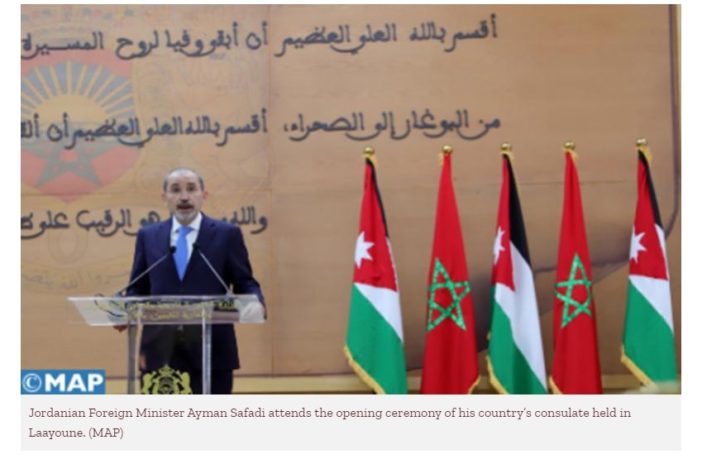The Arab Weekly
The countries that have opened consulates in Laayoune are Cote d’Ivoire, Comoros, Gabon, Sao Tome and Principe, Central African Republic, Burundi, Zambia, Eswatini, the UAE and Bahrain. Gambia, Guinea, Djibouti, Liberia, Burkina Faso, Guinea Bissau, Equatorial Guinea and Haiti have opened consulates in the city of Dakhla.
Jordan crowned its strong bilateral relations with Morocco by inaugurating a consulate in the Western Sahara on Thursday, in a show of support for Moroccan sovereignty.
The new Jordanian consulate is the third diplomatic mission of an Arab state in the Western Sahara.
According to the official Moroccan News Agency (MAP), the consulate’s opening ceremony was held in Laayoune, the largest city in the territory, and attended by both Moroccan Foreign Minister Nasser Bourita and his Jordanian counterpart Ayman Safadi.
Media sources quoted Safadi as saying, “The relations between Jordan and Morocco are distinguished and historic, with uninterrupted coordination.”
“I am honoured to be in Laayoune to inaugurate our consulate after the decision of the Jordanian monarch, King Abdullah II, to open it,” Safadi added.
“We, in the Arab region, need to unite our efforts to face common challenges,” he said, adding that “there are many agreements that we have concluded with Morocco, and we hope that they will be signed at the earliest possible time.”
Bourita pointed out that “Morocco and Jordan maintained their relations under very sensitive and critical Arab and regional conditions,” stressing that “King Abdullah II’s decision to open a consulate in Laayoune translates Jordan’s positions in support of our country towards protecting its security and territorial integrity.”
Jordan’s consulate is the nineteenth to open in the territory, with eleven in Laayoune and eight in Dakhla.
The countries that have opened consulates in Laayoune are Cote d’Ivoire, Comoros, Gabon, Sao Tome and Principe, Central African Republic, Burundi, Zambia, Eswatini, the UAE and Bahrain. Gambia, Guinea, Djibouti, Liberia, Burkina Faso, Guinea Bissau, Equatorial Guinea and Haiti opened consulates in the city of Dakhla.
Jordan’s move to open a consulate in the Western Sahara follows similar moves by the United Arab Emirates on November 4 last year and Bahrain on December 14.
Last November, Amman announced it intended to open a consulate general in Laayoune following a phone call received by Moroccan King Mohammed VI from his Jordanian counterpart, King Abdullah II, in which the Jordanian monarch confirmed his country’s full support for Morocco as it dealt with violations by the separatist Polisario Front following a crisis at the Guerguerat crossing.
The Moroccan king at the time welcomed Jordan’s decision to open a general consulate in Laayoune.
He also expressed his “appreciation and gratitude for Jordan’s position, which falls within the framework of the supportive stances that the Hashemite Kingdom of Jordan has been expressing on the issue of Morocco’s territorial integrity.”
Jordan’s move to open a consulate in the Western Sahara is a victory for Moroccan diplomacy and strengthens the kingdom’s efforts to obtain international recognition of its sovereignty over the region that is disputed by the Polisario Front.
Observers argue that Jordanian support will strengthen the presence of foreign diplomatic representations in south-western Morocco, championing Moroccan sovereignty over the regions of the Western Sahara.
Morocco believes that the opening of foreign diplomatic missions in the Western Sahara confirms its sovereignty over the areas, amid condemnation by the Polisario Front and Algeria, which backs the separatist group.
The success of Moroccan diplomacy has drawn the ire of the Polisraio Front, especially after the United States recognised Morocco’s sovereignty over the Western Sahara and expressed a desire to open a consulate in the region.







